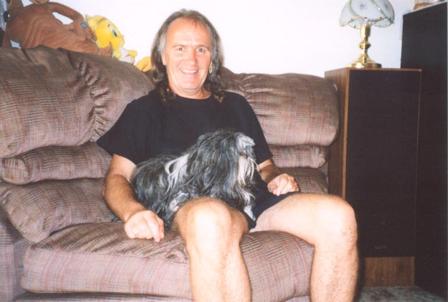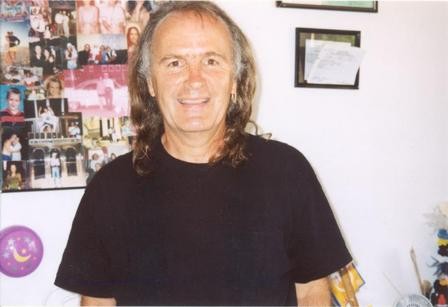|
THE
MERRIAM-WEBSTER ONLINE DICTIONARY defines hippie as: a usually young person who rejects the
mores of established society (as by dressing unconventionally or favoring communal living) and advocates a nonviolent ethic;
broadly: a long-haired, unconventionally dressed young person. Speak to someone who's been living the existence of a
hippie for the past 30 years, and it becomes clear that this definition merely scratches the surface of hippiedom. It's literally
a way of life, almost like ones eye color or sexual orientation. How one dresses has little to do with it. As the subject
of this profile points out, "Anyone can be a hippie; it doesn't matter what you look like or how you dress as long
as you believe in the philosophy."
So what is the philosophy?
Before learning the answer to that question, we need to appreciate the climate in which the hippie movement flourished. Let's
take a little trip back in time. The year is 1968, and America's soldiers are fighting an undeclared war in the jungles of
Asia. Less than five years earlier, the country's first Catholic president had been assassinated; before this year is over,
the leader of the U.S. civil rights movement and the brother of the slain chief executive, himself now running for President,
will both be gunned down as well. Air and water pollution have become hot topics, and the first ripples of Women's Lib are
being felt as post-pubescent gals toss away their bras and begin demanding equal pay for equal work. Recreational drug use
has been let out of the closet, and mixed-race couples are also stepping out into the sunshine. Protesters of the Vietnam
war are burning their draft cards and defecting to Canada to avoid being shipped overseas to, if not certain death, an irrevocable
loss of innocence. In the year to come, Man will land on the moon, and a large segment of humanity will make history by coming
together for three days of peace, love and music at a farm in upstate New York.
Social revolution is everywhere!
At the eye of this hurricane (or, more specifically, at Broadway's Biltmore Theatre), a revolution of a different sort is
taking place. From its opening night on April 29, 1968 to its closing four years later after more than seventeen hundred performances,
the landmark musical Hair will give theatergoers an encapsulated glimpse into the chaotic changes taking place around
them.
Hair's lyrics and dialogue were authored
by James Rado and Gerome Ragni, with a score composed by Galt MacDermot. The play didn't just push the envelope, it ripped
it to shreds! Not too many years previously, the entertainment industry had observed censorship guidelines set by the Hays
office, which Hollywood had established to police itself in the 1930's. Movies and TV were prohibited from showing married
couples sharing a bed, and the word "pregnant" was never uttered. Although live theatre didn't have the same explicit constraints,
Broadway's offerings were traditionally, and almost exclusively, family friendly. Hair dealt with such contemporary
themes as the Vietnam war, the environment, dodging the draft, dropping out of school, illegal drug use, homosexuality, interracial
sex, sex and pregnancy before marriage . . . in other words, everything that was going on behind closed doors. Onstage for
many of these performances was a young refugee from New England named Robin McNamara, whose gratitude to be involved in a project of such magnitude
is evident to this day. "Thank God for [producer] Michael Butler's balls," he exclaims. "Michael saw the beads and incense
and feathers at Joe Papp's Shakespere Festival downtown in [Greenwich] Village in 1967, and was always interested in Indian
culture in general . . . he said to himself, 'this is a wonderful peace and love movement.' And he had the vision to bring
it to Broadway."

|
| ROBIN RELAXING AT HOME WITH A BIT OF 'ERBAL' |
Born in Newton,
Massachusetts on May 5, 1947, Robin grew up during the benign Fifties, the Eisenhower era, a time when the American Dream
was believed within the reach of every family. Dad was the breadwinner and the head of household, Mom was the housewife who
reared the children. Families ate dinner together. Life was placid. In 1954, the foundation of American culture was shaken
by the advent of rock 'n' roll. Suddenly, life wasn't all polished symphonic music and pristine harmonies. Robin gravitated
to the sounds of Elvis Presley and Roy Orbison, and so strong was rock music's influence on him that before most Americans
had ever heard of Liverpool, he was performing with a Beatles-style rock group.
"In tenth grade a couple of
friends of mine played guitar and asked me if I wanted to sing in (a) band," he explains. "It was 1963, and I loved Roy Orbison,
so [we did] some of [his] material; we also did a lot of Buddy Holly material." They christened their group Robin and the
Hoods; in addition to Robin, it featured Len Cirelli, Peter Anise, Joey Delgrasso and George Valley. The Hoods performed locally
in New England. As lead singer, Robin struck a fierce James Dean pose, and he was definitely a rebel with a cause: "I was
one of the first to grow my hair long in those days, and got thrown out of high school a few times because my hair grew too
long. I never cut it on my own; I would wait for them to tell me to cut it, or they would throw me out again, which they
would periodically do! Each time they did, (the band) got free publicity from all the Boston TV, radio, and newspapers. My
parents were so cool about the whole thing just as long as I graduated, so each time, after a few days I would slightly cut
my hair, (just) acceptable enough to get back in. I remember we had a protest with over 500 kids at the school one day all
chanting in unison: 'Leave it long! Let it grow!'" Despite all the turmoil that Robin had gleefully stirred up, he did graduate
with his class.
Having determined by this
time that singing and songwriting were his calling in life, Robin left his native New England to live closer to New York,
where musical dreams were coming true every day for other young hopefuls. He worked in a New Jersey car wash and headed into
Manhattan as often as he could to look for jobs more commensurate with his dreams. If the casting call for Hair had
taken place anywhere other than where it did, Robin would never have known about it. He wasn't particularly enthused about
going, but as it was only a few blocks from his manager's office, he figured why not? If he ended up getting a part, it would
beat working at the car wash! Robin was initially hired as a member of the chorus, then went on to briefly play the role of
Woof before taking on the seminal role of Claude, one of the two male leads in the musical. As Claude, Robin got to sing some
of the strongest numbers in the show, and at the play's end, his character was martyred as a victim of the Vietnam war.
It was awfully hard work.
Anyone who imagines the actors getting high before performances and going onstage totally stoned every night will do well
to remember that Robin had to retain enough of his sensibilities to get through such tongue-twisters as Claude Hooper
Bukowski / finds that its groovy to hide in a movie/ Pretends he's Fellini and Antonioni / And also his countryman Roman Polanski
/ All rolled into one (from "Manchester England") and Long, straight, curly, fuzzy, saggy, shaggy, ratzy, matzy /
Oily, greasy, fleecy, shining, gleaming, streaming, flaxen, waxin (from the title tune) without making a single mistake!
Of course, that doesn't mean the cast members didnt have a ball . . . it was the Sixties, after all, and pot-smoking
was an essential ingredient in the hippie lifestyle as portrayed by the musical. Not to mention the nude scene that raised
more than a few eyebrows!

|
| IN FRONT OF A PHOTO MONTAGE DOCUMENTING THE YEARS |
Robin: "Hair was
the first show ever to have [full-frontal] nudity on Broadway. It really wasn't as hard as one would think; you get so wrapped
up in the show that it sort of came naturally! If you saw the show, you know that the nude scene ends the first act while
Claude is singing 'Where Do I Go.' It is a very poignant moment in the show, and all it was saying is, 'We are all one.' They
used to drop a large cloth on us with Velcro openings for us to pop out of nude. It is a pretty intense time under the cloth
while we are disrobing to get in position for the scene; you don't have much time at all. In the show you would get paid for
little extras that you might either sing or do, and the nude scene was one of them. One night, I just couldn't get my shirt
off for some reason, so I stood up with just my shirt on so as a joke they only paid me half the amount for that performance!"
As to the hippie philosophy,
Robin explains it this way. "To me hippieism was a movement formed out of beatnikism, [and] people like Jack Kerouac and Alan
Ginsberg were the fathers of the movement. If it were not for the Sixties, the world would be a much different place [today]--there
was a social and cultural change that took place throughout the globe. The Sixties [brought forth] a movement of the young
not being afraid to challenge and protest government and the ignorance and madness of war. Our main 'weapon' was our music.
It truly was, and still is, a peace-and-love, non-violent philosophy." Hair owed its success to the fact that it
was real, it was current, it was a reflection of the world as it was, not as people wished for it to be. It mixed all the
elements of modern culture together and presented them powerfully enough so that you couldn't fail to understand, even if
you'd previously ignored what was going on. The show effectively brought the hippie subculture out into the open for the mainstream
to examine.
However, playing lead in the
most celebrated rock musical of all-time wasn't enough for Robin McNamara; he still yearned to realize his own rock 'n' roll
dreams. In 1969, he was introduced to composer/producer Jeff Barry, who signed him to his Steed label. Together with Robin's
then-songwriting partner Jim Cretecos, they wrote a buoyant ditty called "Lay a Little Lovin' On Me," a song whose suggestive
title made Jeff wary at first, until Robin pointed out the success Bob Dylan had had with "Lay, Lady, Lay." Released as a
Steed single, it peaked at #11 on the Billboard charts, and made Robin's name familiar to both theatergoers and non-theatergoers
alike. In-between matinees, Robin did some touring in support of his hit. "It was great fun. I got to work with some really
neat people along the way. One night I shared the bill with John Denver (who had just released 'Country Roads') and Albert
King in El Paso, Texas--what a unique combination that was! After the show we were all invited to go over the border to Juarez.
I will never forget all three of us sitting there drinking XXX beer and listening to a Spanish band doing 'Spinning Wheel.'
What a fun time we had! Lots of hard laughter."
|


